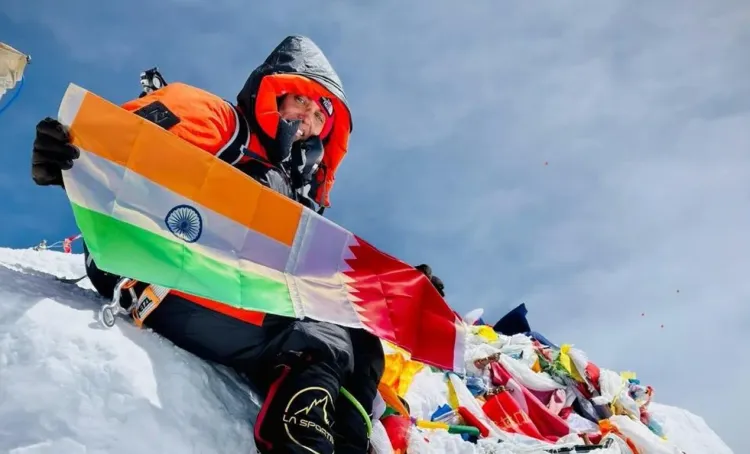How Did Safrina Latheef Become the First Woman from Kerala to Conquer Mount Everest?

Synopsis
Key Takeaways
- Safrina Latheef made history as the first woman from Kerala to summit Mount Everest.
- Her journey emphasizes the importance of support systems in overcoming challenges.
- Climbing Everest involves both physical and mental endurance.
- Safrina highlights the necessity of respecting your gear during climbs.
- Her story serves as a motivational message for women and dreamers everywhere.
Thiruvananthapuram, May 26 (NationPress) In an extraordinary display of bravery, commitment, and determination, Safrina Latheef has made history as the first woman from Kerala to reach the summit of Mount Everest.
However, her journey to the peak was not solely about conquering the mountain; it was a process of personal transformation, forged through dreams and challenges. Transitioning from a banker and an award-winning cake artist to a mountaineer standing at 8,848 metres above sea level, Safrina's journey shattered expectations.
“It was a gradual transformation,” she reflects, reminiscing about the pivotal shift in her life's direction.
“The turning point was when I realized that life is too fleeting to not chase what truly drives you.”
She asserts that her previous professions were not unrelated to her new ambition.
“Skills like discipline, focus, and precision—whether in managing clients or crafting a cake—prepared me for the mountain. Everything contributed to my readiness for this challenge.”
Yet, Everest represents a summit of both mental and physical endurance. During her preparation, she faced a grim reminder of the dangers involved.
“The expedition company provided a letter asking what should be done in the event I didn’t return. Signing it made the reality of death palpable,” she shares softly.
Safrina attributes her ability to manage the emotional challenges to her support network.
“My husband was my anchor. Every time I questioned myself, he reminded me that I was the strongest woman he knew. My mother, despite her fears, kept calling. And my Sherpa, Anoop Gurung, was instrumental in helping me overcome my fear of the Khumbu Icefall. Once I crossed that during the rotation, I knew I could do it again for the summit.”
Climbing Everest came at a significant cost—financially. Safrina and her family sold their apartment to fund the expedition. However, she downplays the material sacrifice.
“We’ve never defined life by our belongings,” she emphasizes.
“The apartment was just a structure we never inhabited. What truly mattered was the journey we undertook together. Each milestone—from gear preparation to reaching base camp—was a collective triumph. Even after my husband was injured, he encouraged me to continue. Thus, this summit belongs to all of us.”
However, the ascent was not merely physically taxing; it was emotionally challenging as well.
Above Camp 3, she traversed what she described as a “graveyard.”
“I encountered three bodies from that season alone. One was lying right near the Hillary Step, beside where I stood in line. That moment shook me. These were individuals like me—dreamers, fighters, with families waiting back home. I vowed: I won’t become a statistic. I will return alive.”
Even survival required careful attention. At one point, a brief removal of her goggles led to snow blindness.
“That experience taught me to respect my gear. It’s not just an accessory; it’s a matter of life and death. We spent years assembling our Everest kit—training on Kilimanjaro, Elbrus, and Aconcagua. I might still lose the tip of a finger to frostbite, but I made it back.”
She stresses the importance of climbing with reliable partners. “We chose Elite Exped for their safety credentials. Trust your Sherpa—they are your lifeline. Remember, the summit is merely halfway. Most accidents occur during the descent. You must maintain your focus at all times.”
For Safrina, reaching the Everest summit is not just about personal achievement; it serves as a powerful message for women and dreamers everywhere.
“Don’t delay,” she urges. “Pursue your dreams now. Life doesn’t guarantee second chances. Even as you devote yourself to your family, don’t neglect your passions. Your happiness is your responsibility.”
Her expedition connected her with legendary mountaineers like NimsDai, Mingma David, Tejan Gurung, and Anoop Gurung.
“Training and climbing under their mentorship was beyond a dream.” To every young woman observing her journey, Safrina has a message from the peak of the world: “Your dreams are valid. With tenacity and the right support, nothing is out of reach.”





